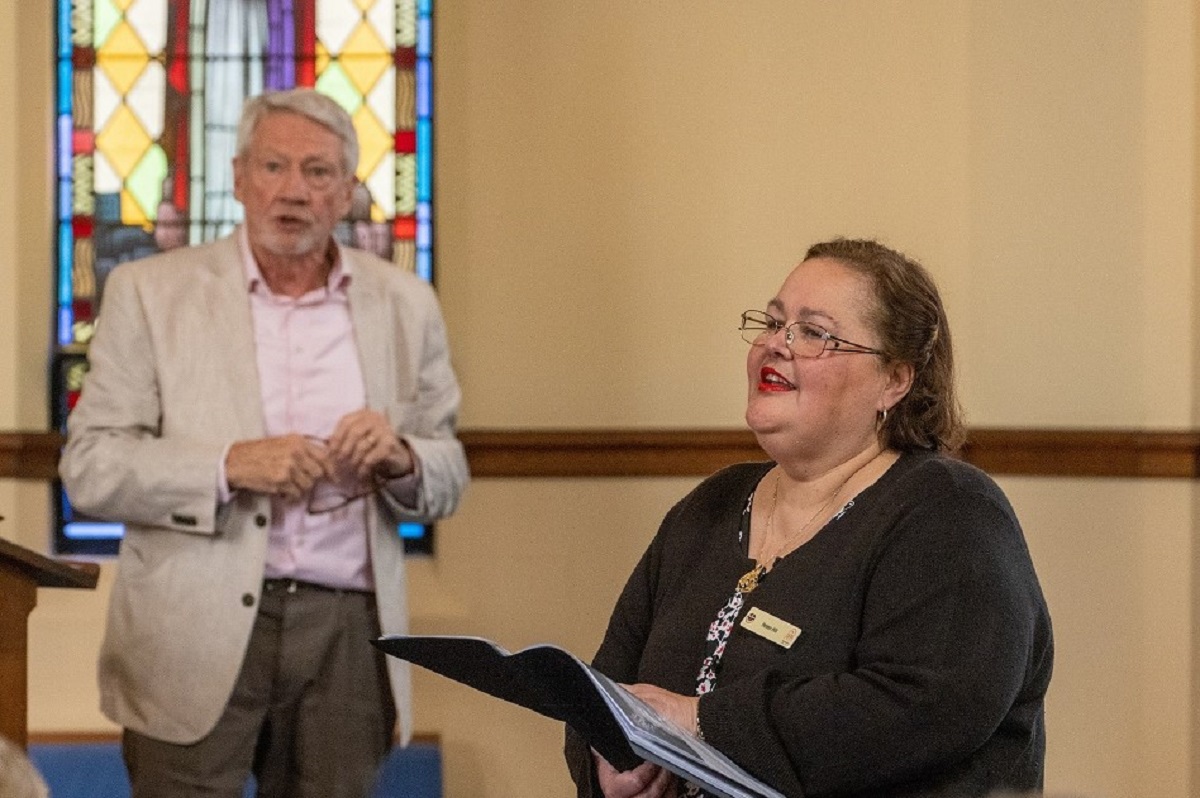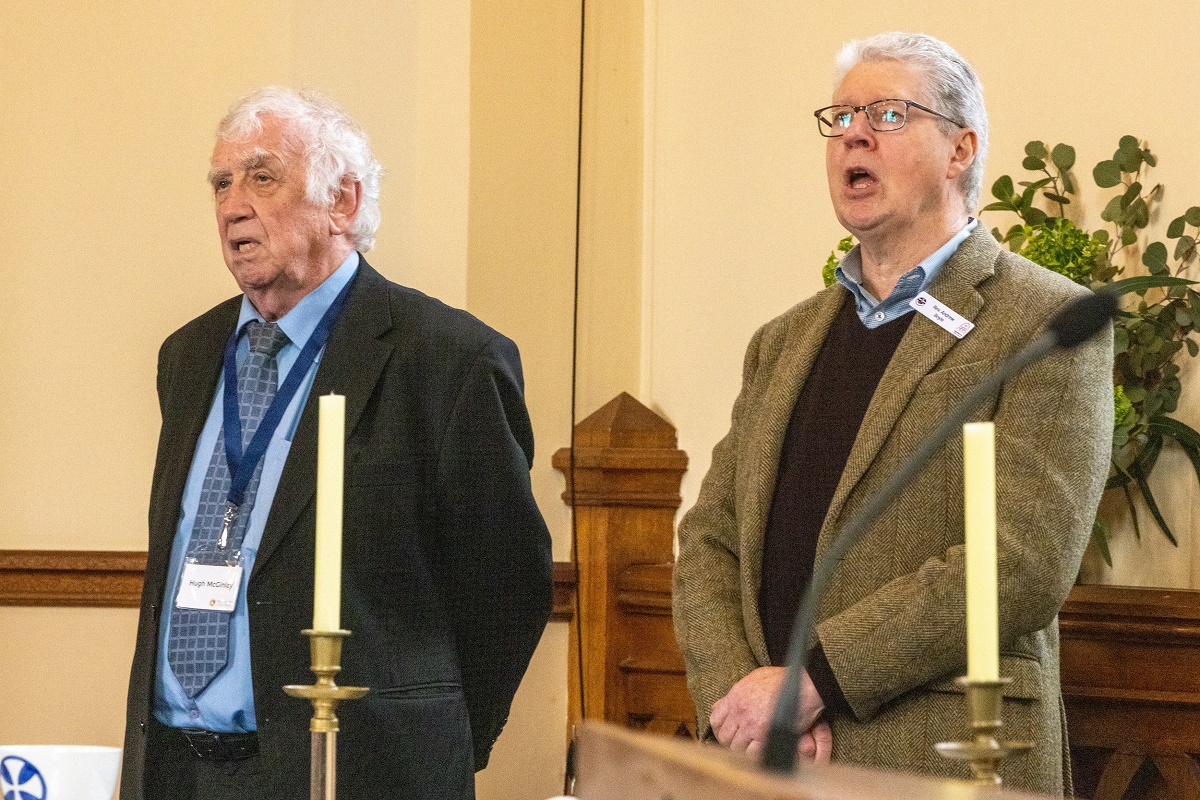For hundreds of years the joy of song has been an important part of worship, as people of faith have raised their voices high in praise of God.
But as times have changed, the words to some songs have become unfamiliar, old-fashioned, and even, at times, archaic.
With that in mind, a new book by former Moderator of Victoria, Rod Horsfield, offers new and contemporary words for familiar tunes.
Rod launched ‘Songs in Season’ at the Highfield Road Uniting Church recently and hopes the new words for familiar music will complement new forms of worship.
“May these musical words provide a way to sing the Lord’s song in the strange land the world has become for the people of God in these times,” he says.
“The soil from which these songs grow is a fertile mixture of firstly, the faith of the Church, secondly, the expression of church in a gathered community, and thirdly, the creative ordering of worship we call the liturgy.
“These elements are combined in an artistic expression in which an encounter with God and the reality of the world we inhabit are taken equally seriously.
“We are living in a time when new forms of worship are being actively explored, producing not only new words and music but new forms of gathering and expressions of faith.
“It is important in this ferment that we discern what is mere novelty and what is truthful innovation.”
In offering ‘Songs in Season’, Rod says it’s important to also consider the nature and place of worship when considering the reworked songs.
“In writing new hymns and songs, I believe that in worship, the people both address, and are addressed by, a God who has chosen to enter human life and history,” he says.
“In the conversation of worship, people praise the God who has so acted, as well as listen for the Word of God addressed to them both communally and individually.
“People also bring the elements and experiences of their own lives in the contemporary world and offer them to God.
Rod holds close a number of convictions about worship he says are important to make it work.
“The first is that the congregation is not an audience,” he says.
“However, that is a common misunderstanding because it makes the people passive spectators to what the people up the front are doing and saying.
“What the church aims to do in its liturgy is not ‘to please the crowd’, but to enable ‘the full, conscious, and active participation of the people’.
“One commentator says, ‘that means that it is the nature of the liturgy to be done by the people. It is not done to people. It is not done for people. It is not done in the presence of people. The people do it … it is as a people that people do liturgy’.”

Rod and Helen Hill at the launch of his book.
Former Uniting Church Assembly President Rev Dr D’Arcy Wood was a co-editor of the Australian Hymn Book (1977), Uniting in Worship (1988), and Together in Song (1999), and is well placed to offer praise for Rod’s work.
“During his years of ministry in the Uniting Church, Rod has been consistently committed to lively and faithful worship,” D’Arcy says.
“He also has a deep interest in poetry. In more recent years, having laid aside the responsibilities of full-time ministry, Rod has devoted more time to the writing of hymns.
“I have had the privilege of commenting on many of his hymns and, in reading and singing them, I have been struck by the facility with which Rod is able to express biblical ideas in clear modern language.
“I am sure that those who sing these hymns will find their faith and understanding enriched.
“The Basis of Union says that the Uniting Church ‘prays that it may be ready when occasion demands to confess the Lord in fresh words and deeds’.
“Rod’s work is a good example of that commitment, and it is to be hoped that, in time, his hymns will be as widely sung as those of the notable Australian hymn-writers and songwriters, such as Geoff Bullock, James McAuley, Robin Mann and Elizabeth Smith.”
‘Songs in Season’ is available through booktopia.com.au, Koorong Bookstores or the Publisher, Coventry Press 33 Scoresby Road Bayswater 3153
Songs of praise
Rod Horsfield offers a history of some of the songs that mean so much to him.
‘God we gather as your people’
It is as an assembly, a body, that worship happens. The church musician Don Saliers illustrates this with a story of being in a congregation with a woman (who used) a motorised wheelchair. He says, “There is certainly pain and limitation in her life. But at the end of one particularly festive liturgy in which children had a role, she came down the aisle to receive communion. After the final blessing and hymn we happened to be in line together going towards the door. With a broad smile and sparkling eyes she said to me, ‘Didn’t we dance today?’.” Singing together achieves that same effect. We create something together that we cannot do alone. And so we often begin the service by singing a gathering song.
‘We praise you God Creator’
I wrote my first song when I was a Minister of the Word in the Ormond congregation some 30 years ago. I had prepared the service of worship for the coming Sunday but I could not find a song of praise in the hymnbook that matched what I was planning to say in the preaching. So I was inspired to write one, drawing on some skills I had from years of writing poetry. This is a song of praise and has a creedal tone, in that it celebrates the work of God in creating a people as agents of God’s work in the world. It also recognises the Church’s origins in the people of Israel. We sometimes forget those origins, that God’s first people was historic Israel and that Jesus was a Jew.

Hugh McGinlay and Rev Andrew Boyle at the book launch.
‘God who am I that I should …’
Though we participate as an assembly in the liturgy, we can also come as individuals with our own personal circumstances. In the liturgy there is space for the individuality of our coming. In my own recent circumstances I have experienced the power of the much maligned “thoughts and prayers” in expressing solidarity in adversity, support in pain and the strength of the community who sings and prays for me when I cannot. The psalms, the hymnbook of the Scriptures, are full of the honest, even angry, protests and pleas of the person who cries out to God. This song is based on Psalm 131, the shortest song in the Psalter. I often read this psalm when sitting with people in hospital or by sick beds. The feminine image for God can be clearly inferred from the interpretation of this Psalm and in many other parts of the Scriptures.
‘Jesus was a stranger and a refugee’
This new understanding of God means that faith can longer be isolated from the life of the world because God has chosen to enter creation as a human being in Jesus of Nazareth. The old saying that “religion and politics” don’t mix, is no longer accepted by most contemporary believers. If God chose to immerse God’s self in the creation and human history, it follows that the life of the world is the theatre into which the people of God’s have to embody their faith. This song tries to make that point and calls people into the struggle for justice as an imperative for faith.

